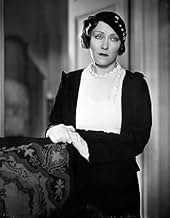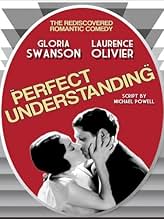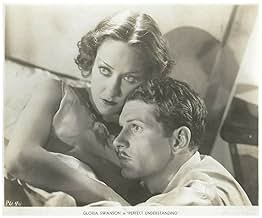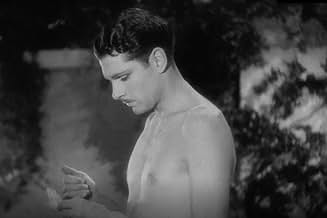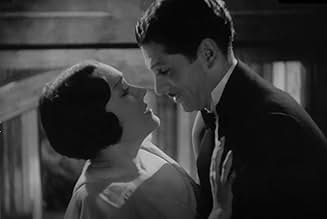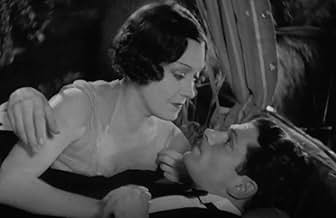IMDb RATING
5.6/10
787
YOUR RATING
A young couple decide to marry under the condition that they agree never to disagree. That agreement is soon put to the test when the husband finds himself attracted to a beautiful young wom... Read allA young couple decide to marry under the condition that they agree never to disagree. That agreement is soon put to the test when the husband finds himself attracted to a beautiful young woman.A young couple decide to marry under the condition that they agree never to disagree. That agreement is soon put to the test when the husband finds himself attracted to a beautiful young woman.
Evalyn Bostock
- Maid
- (uncredited)
Syd Crossley
- Butler
- (uncredited)
Featured reviews
...from United Artists and director Cyril Gardner. Posh British society couple Judy (Gloria Swanson) and Nicholas (Laurence Olivier) decide to get married, but with a "perfect understanding" that they won't tie each other down, and allow the other to maintain their freedom. When Nicholas has a fling with an old flame, Judy spends the night with another man, and their open marriage is sorely tested.
By 1933, these "sophisticated open marriage" melodramas were already old-hat, and nothing new is added here. Swanson and Olivier have very little chemistry, and Olivier has yet to develop much screen charisma (plus he looks downright sickly in his swimsuit scene). The obtrusive, bombastic score is also a detriment. This was an expensive failure for Swanson, who also produced. Co-star Michael Farmer was Swanson's husband at the time. Director Gardner was hired as editor but took over directing duties when original pick Rowland V. Lee was fired.
By 1933, these "sophisticated open marriage" melodramas were already old-hat, and nothing new is added here. Swanson and Olivier have very little chemistry, and Olivier has yet to develop much screen charisma (plus he looks downright sickly in his swimsuit scene). The obtrusive, bombastic score is also a detriment. This was an expensive failure for Swanson, who also produced. Co-star Michael Farmer was Swanson's husband at the time. Director Gardner was hired as editor but took over directing duties when original pick Rowland V. Lee was fired.
That's the song Gloria sings over the closing credits; the reverse could be emblematic of the film, a trying-to-be-chic trifle that is nonetheless amusing in its stilted sophistication and odd cinematography. Gloria and Olivier swan about modern London--she's an American interior decorator, he appears to be independently wealthy--and do some rather pre-Code making out before deciding to marry. Misunderstandings quickly pile up as each, though nominally terribly terribly in love with each other, contemplate extramarital affairs. There's also intrigue about his suspicion that she's carrying someone else's child--it's far too racy to have been made in the U.S. at the time, and was filmed in Britain by Gloria's production company. The dialogue strains to be Somerset Maugham witty and the supporting cast is nothing special, though Miles Malleson has a nice bit. Gloria is certainly glamorous and good at eye-batting, and Olivier, playing a spoiled bachelor it's hard to root for, has some charm. Also fun is the hilariously overemphatic musical scoring--every comma seems to be accentuated with a crescendo. Not much of a movie, but an interesting look at two stars at uncomfortable times in their film careers.
Yes, yes, I know that Sir Laurence thought that all his films before "Wuthering Heights" were garbage. But this is a forgotten gem. Sure, people may not like it, and I get why, because this film doesn't introduce anything new. It's got Judy (Gloria Swanson), an actress I really like, paired with Nick Randall (Laurence Olivier), in a film that involves at first, a good deal of fluff, and then it takes a turn for the dramatic. Honestly, I have to say, the last half hour of the film didn't impress me. Yes, I'm a sucker for fluff and light-hearted stuff, and the fact that Laurence Olivier was looking his best here, at age 26, didn't really predispose me not to like this film. But I have to say about the character of Nick, he was a complete blockhead in the last half hour. He admitted his mistake and wanted forgiveness, but when he thought that Judy did the same thing, gosh, he totally flew off the handle and absolutely frustrated both me and her. You did the same thing, Nick, so you may as well take responsibility. But the jealousy part plays out very realistically, so I don't mind too much. The ending was a bit rushed, though.
Still, watch this movie if you're either a Laurence Olivier fan who just wants to see him (and not mind characters being blockheads), or if you're a Gloria Swanson fan. Nothing new, but enjoyable all the same.
Still, watch this movie if you're either a Laurence Olivier fan who just wants to see him (and not mind characters being blockheads), or if you're a Gloria Swanson fan. Nothing new, but enjoyable all the same.
"Perfect Understanding" is a simply dreadful film--very, very dated, dull and filled with folks you really cannot relate to or like. It also features the rather odd romantic pairing of Gloria Swanson and Laurence Oliver--a pairing that doesn't quite work.
The film begins with Swanson singing--something you just don't need to hear unless you are a masochist. Fortunately, Olivier's character didn't love her singing either, though otherwise they play rich folks who have nothing better to do than go to parties, travel the world and talk...a lot. And one of the things they love to talk about is their love for each other. However, Swanson's character is apprehensive to marry, as she's afraid that over time their love will fade. So, they agree to marry and stay married until they begin to argue (ooo, how romantic).
The biggest problem about this film is that it was the Depression and folks were out of work. So, such a mannered and dull film involving the rich and lazy seems strange--and hard to enjoy. The characters seemed rather one-dimensional and annoying. In particular, Swanson's acting didn't help, though Olivier did a nice job in spite of the film's many shortcomings. Dull and probably not worth your time.
The film begins with Swanson singing--something you just don't need to hear unless you are a masochist. Fortunately, Olivier's character didn't love her singing either, though otherwise they play rich folks who have nothing better to do than go to parties, travel the world and talk...a lot. And one of the things they love to talk about is their love for each other. However, Swanson's character is apprehensive to marry, as she's afraid that over time their love will fade. So, they agree to marry and stay married until they begin to argue (ooo, how romantic).
The biggest problem about this film is that it was the Depression and folks were out of work. So, such a mannered and dull film involving the rich and lazy seems strange--and hard to enjoy. The characters seemed rather one-dimensional and annoying. In particular, Swanson's acting didn't help, though Olivier did a nice job in spite of the film's many shortcomings. Dull and probably not worth your time.
Gloria Swanson had formed a film company just to make this film. Unfortunately, this is precisely the type of film that her most famous character, Norma Desmond, likely wanted to make in Sunset Boulevard.
It is really a silent film with dialog replacing the text screens. The actors make grand extravagant gestures, turn their faces to and fro while fluttering their eyelids. The incessant music swells at appropriate moments to indicate high drama. The dialog seems like a nuisance to be summarily added and neglected - after all Swanson had done pretty well for all those years without dialog - why worry about that now.
The quite modern premise of the film, a semi-open marriage, and the conflict brought on by the juxtaposition of the end of the flapper era avant-garde attitudes with the conservative Victorian mores ensconced in the judicial attitude towards divorce should have made the film more interesting that it was.
However, the only real interest and tension is generated by incredible boat race where cocktails are drunk at every station to make the race more difficult! Prohibition was about to be repealed and the celebration of alcohol consumption in such stark contrast to today's attitudes is fascinating.
Tighter editing, better pacing and dialog might have made this worthwhile. As is, it is a curio from the early years of sound, and of interest to the historian and perhaps to the film buff as a primer on the world of Norma Desmond.
It is really a silent film with dialog replacing the text screens. The actors make grand extravagant gestures, turn their faces to and fro while fluttering their eyelids. The incessant music swells at appropriate moments to indicate high drama. The dialog seems like a nuisance to be summarily added and neglected - after all Swanson had done pretty well for all those years without dialog - why worry about that now.
The quite modern premise of the film, a semi-open marriage, and the conflict brought on by the juxtaposition of the end of the flapper era avant-garde attitudes with the conservative Victorian mores ensconced in the judicial attitude towards divorce should have made the film more interesting that it was.
However, the only real interest and tension is generated by incredible boat race where cocktails are drunk at every station to make the race more difficult! Prohibition was about to be repealed and the celebration of alcohol consumption in such stark contrast to today's attitudes is fascinating.
Tighter editing, better pacing and dialog might have made this worthwhile. As is, it is a curio from the early years of sound, and of interest to the historian and perhaps to the film buff as a primer on the world of Norma Desmond.
Did you know
- TriviaMichael Farmer's acting was so bad that, despite being married to the movie's star and main backer Gloria Swanson, he was all but edited out of the movie, giving more screentime to Sir Laurence Olivier.
- Quotes
Ivan Ronnson: Jealousy is a wild beast.
- ConnectionsFeatured in Boulevard! A Hollywood Story (2021)
- SoundtracksI Love You So Much That I Hate You
(uncredited)
Music by Henry Sullivan
Lyrics by Rowland Leigh
Sung by Gloria Swanson
Details
- Release date
- Country of origin
- Language
- Also known as
- Perfect Understanding
- Filming locations
- Gosport, Hampshire, England, UK(location)
- Production company
- See more company credits at IMDbPro
- Runtime
- 1h 20m(80 min)
- Color
- Aspect ratio
- 1.37 : 1
Contribute to this page
Suggest an edit or add missing content


